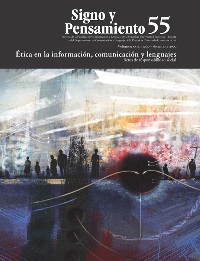Abstract
This paper aims to examine the present status of the research field intercultural information ethics (IIE) including the foundational debate as well as specific issues that may open new views for research and practice in this field. The present iie debate focuses on a narrow view of the field leaving aside comparative studies with non-digital media as well as with other epochs and cultures. There is an emphasis on the question of privacy but other issues such as online communities, governmentality, gender issues, mobile phones, health care and the digital divide are on the agenda.
Bynum, Terrell Ward (2006). Flourishing Ethics. Ethics and Information Technology, 8: 157-173.
Capurro, Rafael (2007). Intercultural Information Ethics. In: Capurro, Rafael / Frühbauer, Johannes / Hausmanninger, Thomas (Eds.): Localizing the Internet. Ethical aspects in intercultural perspective. Munich: Fink, 21-38. Online: http://www. capurro.de/iie.html
Capurro, Rafael (2006a). Ethik der Informationsgesellschaft. Ein interkultureller Versuch. Online: http://www.capurro.de/parrhesia. html (accessed on April 21, 2008).
Capurro, Rafael (2005a). Privacy. An intercultural perspective. In Ethics and Information Technology 7: 37-47. Online: http://www.capurro. de/privacy.html
Capurro, Rafael / Frühbauer, Johannes / Hausmanninger, Thomas (Eds.) (2007). Localizing the Internet. Ethical aspects in intercultural perspective. Munich: Fink.
Damasio, Antonio (1994). Descartes’ Error: Emotion, Reason, and the Human Brain. Putnam Publishing.
Ess, Charles (2007). Can the Local Reshape the Global? Ethical Imperatives for Humane Intercultural Communication Online”. In Capurro, Rafael / Frühbauer, Johannes / Hausmanninger, Thomas (Eds.) (2007). Localizing the Internet. Ethical aspects in intercultural perspective. Munich: Fink, 153-169.
Ess, Charles (2006). Ethical pluralism and global information ethics. In Ethics and Information Technology 8:215-226.
Floridi, Luciano / Savulescu, Julian (2006). Information ethics: Agents, artefacts and new cultural perspectives. Ethics and Information Technology 8: 155-156.
Foucault, Michel (1983). Discourse and Truth: the Problematization of Parrhesia. University of California at Berkeley, October-November 1983. Online: http://foucault.info/documents/ parrhesia/ (Accessed on April 21, 2008).
Frohmann, Bernd (2007). Foucault, Deleuze, and the Ethics of Digital Networks. In Capurro, Rafael / Frühbauer, Johannes / Hausmanninger, Thomas (Eds.) (2007). Localizing the Internet. Ethical aspects in intercultural perspective. Munich: Fink, 57-68.
Grodzinsky, Frances S. / Tavani, Herman T. (2007). The Internet and Community Building at the Local and Global Levels: Some Implications and Challenges. I. Capurro, Rafael / Frühbauer, Johannes / Hausmanninger, Thomas (Eds.): Localizing the Internet. Ethical aspects in intercultural perspective. Munich: Fink, 135-149.
Heidegger, Martin (1987). Being and Time. Translated by John Macquarrie & Edward Robinson, Oxford: Basil Blackwell. Hiruta, Kei (2006). What pluralism, why pluralism, and how? A response to Charles Ess. Ethics and Information Technology 8: 227-236.
Hongladarom, Soraj (2007). Analysis and Justification of Privacy from a Buddhist Perspective. In Hongladarom, Soraj / Ess, Charles (Eds.): Information Technology Ethics: Cultural Perspectives. Hershey, Pennsylvania: Idea Group, 108-122.
Hongladarom, Soraj / Ess, Charles (Eds.) (2007). Information Technology Ethics: Cultural Perspectives. Hershey, Pennsylvania: Idea Group.
Hongladarom, Soraj / Ess, Charles (2007a): Preface. In: ibid.: Information Technology Ethics: Cultural Perspectives. Hershey, Pennsylvania: Idea Group, xi-xxxiii.
Hongladarom, Soraj (2001). Cultures and Global Justice. Online: http://www.polylog.org/them/3/fcshs-en-htm (Accessed on April 21, 2008).
International Review of Information Ethics (irie) (2004). International ICIE Symposium. Online: http://www.i-r-i-e.net/ (Accessed on April 21, 2008).
Kitiyadisai, Krisana (2005). Privacy rights and protection: foreign values in modern Thai context. In Ethics and Information Technology 7: 17-26.
Lü, Yao-huai (2007). Globalization and Informatioan Ethics. In Capurro, Rafael / Frühbauer, Johannes / Hausmanninger, Thomas (Eds.): Localizing the Internet. Ethical aspects in intercultural perspective. Munich: Fink, 69-73.
Lü, Yao-huai (2005). Privacy and data privacy in contemporary China. In Ethics and Information Technology, 7: 7-15.
Nishigaki, Toru and Takenouchi, Tadashi (eds.) (2007): The Thought of Information Ethics. Tokyo: Communis 05 (in Japanese).
Nakada, Makoto (2007). The Internet within Seken as an old and indigenous world of meanings in Japan”. In Capurro, Rafael / Frühbauer, Johannes / Hausmanninger, Thomas (Eds.): Localizing the Internet. Ethical aspects in intercultural perspective. Munich: Fink, 177-203.
Nakada, Makoto / Tamura, Takanori (2005). Japanese conceptions of privacy: An intercultural perspective. In Ethics and Information Technology 7: 27-36.
Nishigaki, Toru (2006). The ethics in Japanese information society: Consideration on Francisco Varela’s The Embodied Mind from the perspective of fundamental informatics. Ethics and Information Technology, 8:237-242.
Rhee, Wonil (2007). The creative time of thermocline. Conflicts between and Becomings of different Time-spaces. In “Thermocline of Art. New Asian Waves” at the Center for Art and Media (Karlsruhe, Germany) Online: http://www.zkm.de/thermocline (Accessed on April 21, 2008).
Sontag, Susan (2004). Die Welt als Indien. In Lettre International, September, Vol. 65, 82-86.
Walzer, Michael (1994). Thick and Thin: Moral Arguments at Home and Abroad. Notre Dame: University of Notre Dame Press.
Wittgenstein, Ludwig (1989). Vortrag über Ethik. Frankfurt a. M.: Suhrkamp.
Wittgenstein, Ludwig (1984). Zu Heidegger. In: B.F. McGuiness (Ed.): Ludwig Wittgenstein und der Wiener Kreis. Gespräche, aufgezeichnet von Friedrich Waismann. Frankfurt a. M.: Suhrkamp.
This journal is registered under a Creative Commons Attribution 4.0 International Public License. Thus, this work may be reproduced, distributed, and publicly shared in digital format, as long as the names of the authors and Pontificia Universidad Javeriana are acknowledged. Others are allowed to quote, adapt, transform, auto-archive, republish, and create based on this material, for any purpose (even commercial ones), provided the authorship is duly acknowledged, a link to the original work is provided, and it is specified if changes have been made. Pontificia Universidad Javeriana does not hold the rights of published works and the authors are solely responsible for the contents of their works; they keep the moral, intellectual, privacy, and publicity rights.
Approving the intervention of the work (review, copy-editing, translation, layout) and the following outreach, are granted through an use license and not through an assignment of rights. This means the journal and Pontificia Universidad Javeriana cannot be held responsible for any ethical malpractice by the authors. As a consequence of the protection granted by the use license, the journal is not required to publish recantations or modify information already published, unless the errata stems from the editorial management process. Publishing contents in this journal does not generate royalties for contributors.


